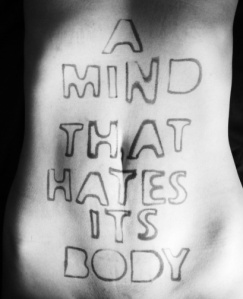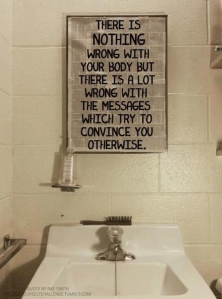Last night I had the pleasure of being interviewed by Emily Kennedy, a sociology PhD student studying the role of the Internet in shaping the ways in which we view sex work and sex workers. It was a fantastic experience- one of the highlights was when I started talking about my experience with withdrawing from my counseling program and she jumped in her seat: “That’s you?! I saw that post on Tumblr!! I can’t believe you’re part of my interview sample!” She was so excited, and I loved that she had seen the HoP post. We talked about how Internet use has helped me attract customers, how I have communicated with regulars, how I got started stripping and why, who I have disclosed my experiences to and why, if I have had any negative experiences with school or law enforcement or other people in my life, and whether I think there has been a shift in general attitude toward sex work in the past 10-20 years. It was really fun to talk about all of that with a sociology student who herself has direct experience with sex work and also has a deep curiosity for how sex work is viewed and treated culturally in our country.
My interview came after an interesting afternoon at work, something I am still somewhat processing. I met with a coworker to discuss planning a financial planning workshop for sex workers in the area, and after about 20 minutes of me offering a lot of information without much clarity of source, she asked me:
So… how did you get involved in this work?
I stumbled for a minute, and probably looked a bit uncomfortable. Ummm…
You don’t have to tell me at all! It’s okay.
No, I’ve been struggling with this. And so I guess I’ll just tell you, and you (as I nodded to the coworker who I share an office with). I’ve actually been a stripper, so that’s how I got really interested in sex workers rights and advocacy.
Well that is so cool! You have a lot of insight then and probably a better ability to reach this population. What an asset. How great!
After I told my two coworkers I started doubting myself- was that a smart decision? Why can’t I just keep my mouth shut? What is wrong with me? So many people don’t talk about their personal lives at work- why do I have this compulsive need to be out everywhere?
I remember Louisa Leontiades telling me in a Skype chat once:
It’s addicting to be yourself.
It’s so true. Once you have felt what it’s like to be yourself, totally and completely, without shame and without regard for what others think, it’s hard to go back. It’s hard to stuff pieces of yourself away, for fear of retaliation or judgement.
I had a longer conversation with my officemate after the other person left, and she understood completely my need for discretion and to continue to feel out the culture of our program and the attitude of other coworkers. I trust her and I don’t worry about her telling anyone or gossiping about it. Then later, I emailed my other coworker and thanked her for her understanding and respect and discretion. And she replied with more kindness and a confirmation that she adheres to the Vegas rule- whatever was said in our office, stays in our office.
I need to trust my intuition about people- my coworkers felt like safe and supportive people to disclose to, and they are. While I have largely had good experiences coming out as a stripper, I also have enough experience from my school snafu to know that not everyone sees my stripping experience as an empowering, rich, and positive perspective. So taking it slow in my new work environment in disclosing feels like a good path to take. I am also feeling more “all here,” which is freeing and grounding at the same time.
One of the last questions that Emily asked me last night was: You’re only 25, but how do you think general attitudes toward sex work has changed in the past 20 years?
To which I replied:
Well, I was only 5 20 years ago, but I know from the time I was in high school to now, I personally have undergone a massive shift in how I view sex work. I used to have my mom’s attitude toward sex work- that it is objectifying, degrading, and hurts all women and people. I carried that through college, and it wasn’t until my partner and I opened up that I had a catalyst to unpack my views surrounding sexuality and sex work. I have noticed that a lot of other women in my age cohort have gone through similar transformations with how they view sexuality and sex work, although they have had different catalysts than me. It gives me hope!
She laughed and agreed.
 -The lunch keynote was by a Native American man who works with the Two Spirit communities in Montana and also does HIV prevention and education on the reservations. It was really cool. I also learned that Running Eagle, for whom a water feature is named in Glacier National Park, was Two Spirit.
-The lunch keynote was by a Native American man who works with the Two Spirit communities in Montana and also does HIV prevention and education on the reservations. It was really cool. I also learned that Running Eagle, for whom a water feature is named in Glacier National Park, was Two Spirit. Luckily, you can repair past damage through psychotherapy, exercise, and certain medications and plants. There has also been a paradigm shift in treating addictions. The past approach was: “Addiction is something people do to feel good and be hedonistic. Just stop!” The current approach is: “Addiction is something people do to feel normal and like everyone else.”
Luckily, you can repair past damage through psychotherapy, exercise, and certain medications and plants. There has also been a paradigm shift in treating addictions. The past approach was: “Addiction is something people do to feel good and be hedonistic. Just stop!” The current approach is: “Addiction is something people do to feel normal and like everyone else.” As many of my long-time readers and friends know, I have struggled with body image for a long time- since I was about 8. There have been periods in my life which have felt better and periods which I have felt much, much worse. Much of my mood surrounding my body image has been pinned to my weight, and a particular number on the scale.
As many of my long-time readers and friends know, I have struggled with body image for a long time- since I was about 8. There have been periods in my life which have felt better and periods which I have felt much, much worse. Much of my mood surrounding my body image has been pinned to my weight, and a particular number on the scale.






